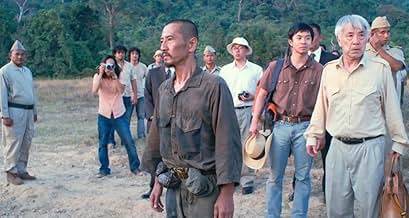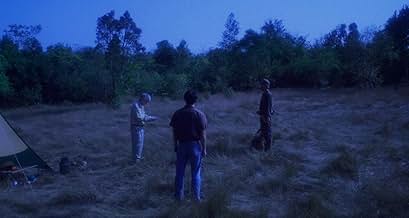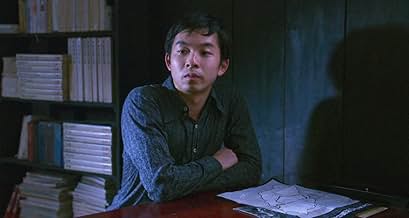IMDb-BEWERTUNG
7,2/10
3294
IHRE BEWERTUNG
Als Japan am Ende des Zweiten Weltkriegs kapituliert, zieht sich der Soldat Hiroo Onoda in den Dschungel der Philippinen zurück, um den Krieg selbst noch 10.000 Tage lang fortzusetzen.Als Japan am Ende des Zweiten Weltkriegs kapituliert, zieht sich der Soldat Hiroo Onoda in den Dschungel der Philippinen zurück, um den Krieg selbst noch 10.000 Tage lang fortzusetzen.Als Japan am Ende des Zweiten Weltkriegs kapituliert, zieht sich der Soldat Hiroo Onoda in den Dschungel der Philippinen zurück, um den Krieg selbst noch 10.000 Tage lang fortzusetzen.
- Regie
- Drehbuch
- Hauptbesetzung
- Auszeichnungen
- 5 Gewinne & 20 Nominierungen insgesamt
Yûya Endô
- Hiroo Onoda - Young
- (as Endô Yûya)
Kanji Tsuda
- Hiroo Onoda - Old
- (as Tsuda Kanji)
Yûya Matsuura
- Kinshichi Kozuka - Young
- (as Matsuura Yûya)
Tetsuya Chiba
- Kinshichi Kozuka - Old
- (as Chiba Tetsuya)
Shinsuke Kato
- Shôichi Shimada
- (as Katô Shinsuke)
Kai Inowaki
- Yûichi Akatsu
- (as Inowaki Kai)
Issei Ogata
- Major Yoshimi Taniguchi
- (as Issey Ogata)
Taiga Nakano
- Norio Suzuki - The Tourist
- (as Nakano Taïga)
Nobuhiro Suwa
- Tanejirô Onoda - Onoda's Father
- (as Suwa Nobuhiro)
Mutsuo Yoshioka
- Captain Hayakawa
- (as Yoshioka Mutsuo)
Tomomitsu Adachi
- Governor-General Shigenori Kuroda
- (as Adachi Tomomitsu)
Kyûsaku Shimada
- Lieutenant Suehiro
- (as Shimada Kyûsaku)
Jemuel Satumba
- Filipino Prisoner
- (as Jemuel Cedrick Satumba)
Ryû Morioka
- Student
- (as Ryu Morioka)
Akira Morita
- Extra
- (as Morita Akira)
Empfohlene Bewertungen
Greetings again from the darkness. There has been no shortage of conspiracy theories, either recently or historically, that have left non-believers bewildered at how 'the other side' held firm. Writer-director Arthur Harari and his co-writers Bernard Cendron and Vincent Poymiro bring the remarkable struggle of Hiroo Onoda to the screen. Onoda was a Japanese soldier who refused to believe WWII ended, and instead, continued his mission of resistance by spending thirty years in a Filipino jungle.
Onoda was only 22 when he entered the war in 1944. He is played as a young man by Yuya Endo, and in later years by Kanji Tsuda. The film goes mostly in chronological order, with only occasional flashbacks to Onoda's "special training" by Taniguchi (Issey Ogata), his trainer and trainer. The passing of years is noted on screen, and we watch as Onoda's squadron shrinks in size, holding at four for quite a while, before shifting to two, and finally only he remains. During the special training, Taniguchi declares, "You don't have the right to die", instilling a firm commitment to the cause in Onoda.
Also seared into Onoda's brain is the proclamation of, "We'll come back for you. No matter how long it takes, we'll come back for you." Still, it's fascinating to see his determination to keep fighting, despite so many signs that the war was over. He viewed magazine articles and radio broadcasts as tricks to draw him away from his mission ... going so far to decipher a coded message that was anything but that.
The young man who finally succeeds in lulling Onoda out of the jungle has his own mission - actually three of them: finding a panda, locating Onoda (by this time a legend), and tracking down a Yeti. It's a bittersweet moment for the long-dedicated soldier, and he went on to live many more years as a home country icon - considered a nationalist man of honor by some, a murdering fool by others. The film, and Onoda's saga, makes us question the point of war when it's impossible to tell if the war is over or ongoing. Harari's film is almost three hours, which is entirely too long ... but significantly shorter than the time Onoda spent in the jungle.
Releasing in theaters on October 14, 2022.
Onoda was only 22 when he entered the war in 1944. He is played as a young man by Yuya Endo, and in later years by Kanji Tsuda. The film goes mostly in chronological order, with only occasional flashbacks to Onoda's "special training" by Taniguchi (Issey Ogata), his trainer and trainer. The passing of years is noted on screen, and we watch as Onoda's squadron shrinks in size, holding at four for quite a while, before shifting to two, and finally only he remains. During the special training, Taniguchi declares, "You don't have the right to die", instilling a firm commitment to the cause in Onoda.
Also seared into Onoda's brain is the proclamation of, "We'll come back for you. No matter how long it takes, we'll come back for you." Still, it's fascinating to see his determination to keep fighting, despite so many signs that the war was over. He viewed magazine articles and radio broadcasts as tricks to draw him away from his mission ... going so far to decipher a coded message that was anything but that.
The young man who finally succeeds in lulling Onoda out of the jungle has his own mission - actually three of them: finding a panda, locating Onoda (by this time a legend), and tracking down a Yeti. It's a bittersweet moment for the long-dedicated soldier, and he went on to live many more years as a home country icon - considered a nationalist man of honor by some, a murdering fool by others. The film, and Onoda's saga, makes us question the point of war when it's impossible to tell if the war is over or ongoing. Harari's film is almost three hours, which is entirely too long ... but significantly shorter than the time Onoda spent in the jungle.
Releasing in theaters on October 14, 2022.
In anticipation of the Allied landings on the Philippine island of Lubang, the Japanese send a small squad to engage in some guerrilla warfare activities pending the reorganisation of their own troops ready to return in due course. Amongst these men is the young Lt. Hiroo Onoda. He is an idealistic young man who firmly believes in his cause and is determined to do what he can, for as long as he can. Now what we know from the outset is that his nation surrenders in 1945, one year after these troops are deployed - but nobody tells Onoda. With his small squad still patrolling the island, their team begins to fracture. Their discipline to fail. The relentless monsoon rains; disease and the activities of the locals begin to reduce their number but he is adamant that he will stay on duty for as long as it takes - even if that takes us into the 1970s. Both Yûya Endô as the younger man and Kanji Tsuda as the older one play their parts convincingly as the story, based on real facts, illustrates the tough life amidst the dense jungle where they are seemingly abandoned by their own side and left to their own, limited, devices. The story mixes the timelines so we skip from young to older, and that's quite effective at breaking up the story to avoid it being just a straightforward chronology. It also uses the other characterisations to demonstrate the increasing frustrations of these men as personalities clashed and loyalties, and authority, is tested. As we proceed their's becomes more of a brotherhood than an army unit, and that makes the tragedies and misfortunes that befall them all the more poignant. It's history, so there isn't much latitude as to the denouement, but when we do get there it's quite a touching conclusion that seems just a bit rushed, but entirely fitting.
This is really an outstanding movie which is not a "war movie" but rather a complex psychological one of what drive us as a person to take a stand when confronted to situations we could not have ever imagined. Of course education, training, the society, family history, the culture of the country in which you were born, all of this will play a major role with regard to the choice(s) that we will take in life. However, as per prior personal experiences and call it maybe "the genetics" these choices will be different for people even having the same cultural background. The life story of lieutenant Onoda is maybe what you could call an "extreme" one which, besides cultural background, was certainly facilitated by his "physical adaptation" allowing him to endure the certain hardships and harrowing experiences he encountered during his many years of isolation.
Onoda is a long movie but its length was necessary not to develop the psychological development of the main character but rather to allow the viewer to "feel" what it must have meant in terms of hardship, endurance and faith the choices that Lieutenant Onoda took to honor his pledge of obedience regardless the validity of the cause he chose to defend.
The fact the movie Onoda was released in full pandemic, of the relatively unknown nature of the real history of lieutenant Onoda and that the film must only be shown in the Japanese language (with subtitles) as an indispensable component of the story will certainly limit its diffusion in theaters. Still this will not hamper the fact that this is cinema of the highest caliber and that Arthur Harari, its French director succeeded in making an admirable movie not to be missed!
Onoda is a long movie but its length was necessary not to develop the psychological development of the main character but rather to allow the viewer to "feel" what it must have meant in terms of hardship, endurance and faith the choices that Lieutenant Onoda took to honor his pledge of obedience regardless the validity of the cause he chose to defend.
The fact the movie Onoda was released in full pandemic, of the relatively unknown nature of the real history of lieutenant Onoda and that the film must only be shown in the Japanese language (with subtitles) as an indispensable component of the story will certainly limit its diffusion in theaters. Still this will not hamper the fact that this is cinema of the highest caliber and that Arthur Harari, its French director succeeded in making an admirable movie not to be missed!
Although a little bit long, this is about offering us to share a rather unique and captivating life experience, that of brainwashed Japanese soldiers who only stopped the war 30 years after the capitulation. I appreciated the warm and moist beauty of the jungle and the tropical forest, the change of scenery provided, the sober image which seems authentic and of the period, the "film" aspect and documentary grain. Documentary also as long as there is no lady state. Innocent people go there. The story that is told to us is quite simply captivating and I would not have believed that this anecdote from History, which could be summed up in a few lines, could fit into such a great film. With hindsight, however, I can understand that it does not please some who would fall into boredom; with this film it's a bit all or nothing, you have to succeed in immersing yourself. It is a French film, and as such it must be emphasized that it is a nugget.
Hiro Onoda is talked of in WW2 history as being the last Japanese soldier to surrender; 29 years after the end of WW2 in 1945 (1946 for total end for Japan) on the Philippine island of Lubang. I often wonder why they chose him as the one who got the most attention, story's and films. This is because he was not the last Japanese soldier of WW2 to surrender.
That particular piece of history belongs to Teruo Nakamura who lived for 30 years in the jungle of Morotai; in the old Dutch East Indies. I found out it was because he was treated disgustingly by the Japanese government of the time in 1974 and, that they did not consider him worthy of Japanese soldier honours. This was because his real name was Attun Palalin and he came from ethnic 'Amis', as a native of Taiwan, which was then called Formosa Island, before World War II became a colony of the Japanese Empire.
They and over a 100 others were found scattered on various islands, still fighting years after the end of the war. The last most recent discovery is of 2 soldiers aged 83 and 86 who were found 60 years after the wars end.
I'm sure that there were probably a good many who were never found and that is a shame the Japanese will have to bear forever. It is good that story's such as this come to light and allow later generations to realize the sheer futility of war. The only negative to this film was it being at least an hour too long (it runs for 2:46 minutes) and, very slow paced and a personal belief that this did not follow his story as written in his daily diary of events.
R. I. P. To all of those brave men, lost souls and survivors and also, to any other nationality soldiers who were left behind and stranded on ex island military bases.
To hell with Russia's Vladimir Putin and his attempt to take back what Russia wrongly stole after WW2. The Ukraine is 'Not Gonna Take It' and a lot of Russian families will once again suffer the wasted loss of loved ones.
That particular piece of history belongs to Teruo Nakamura who lived for 30 years in the jungle of Morotai; in the old Dutch East Indies. I found out it was because he was treated disgustingly by the Japanese government of the time in 1974 and, that they did not consider him worthy of Japanese soldier honours. This was because his real name was Attun Palalin and he came from ethnic 'Amis', as a native of Taiwan, which was then called Formosa Island, before World War II became a colony of the Japanese Empire.
They and over a 100 others were found scattered on various islands, still fighting years after the end of the war. The last most recent discovery is of 2 soldiers aged 83 and 86 who were found 60 years after the wars end.
I'm sure that there were probably a good many who were never found and that is a shame the Japanese will have to bear forever. It is good that story's such as this come to light and allow later generations to realize the sheer futility of war. The only negative to this film was it being at least an hour too long (it runs for 2:46 minutes) and, very slow paced and a personal belief that this did not follow his story as written in his daily diary of events.
R. I. P. To all of those brave men, lost souls and survivors and also, to any other nationality soldiers who were left behind and stranded on ex island military bases.
To hell with Russia's Vladimir Putin and his attempt to take back what Russia wrongly stole after WW2. The Ukraine is 'Not Gonna Take It' and a lot of Russian families will once again suffer the wasted loss of loved ones.
Wusstest du schon
- WissenswertesWhilst set on a remote Philippines Island the film was in fact shot on location in the kingdom country of Cambodia.
Top-Auswahl
Melde dich zum Bewerten an und greife auf die Watchlist für personalisierte Empfehlungen zu.
- How long is Onoda: 10,000 Nights in the Jungle?Powered by Alexa
Details
- Erscheinungsdatum
- Herkunftsländer
- Offizielle Standorte
- Sprachen
- Auch bekannt als
- Onoda: 10,000 Nights in the Jungle
- Drehorte
- Produktionsfirmen
- Weitere beteiligte Unternehmen bei IMDbPro anzeigen
Box Office
- Budget
- 4.530.000 € (geschätzt)
- Weltweiter Bruttoertrag
- 262.276 $
- Laufzeit
- 2 Std. 53 Min.(173 min)
- Farbe
- Seitenverhältnis
- 1.85 : 1
Zu dieser Seite beitragen
Bearbeitung vorschlagen oder fehlenden Inhalt hinzufügen






































